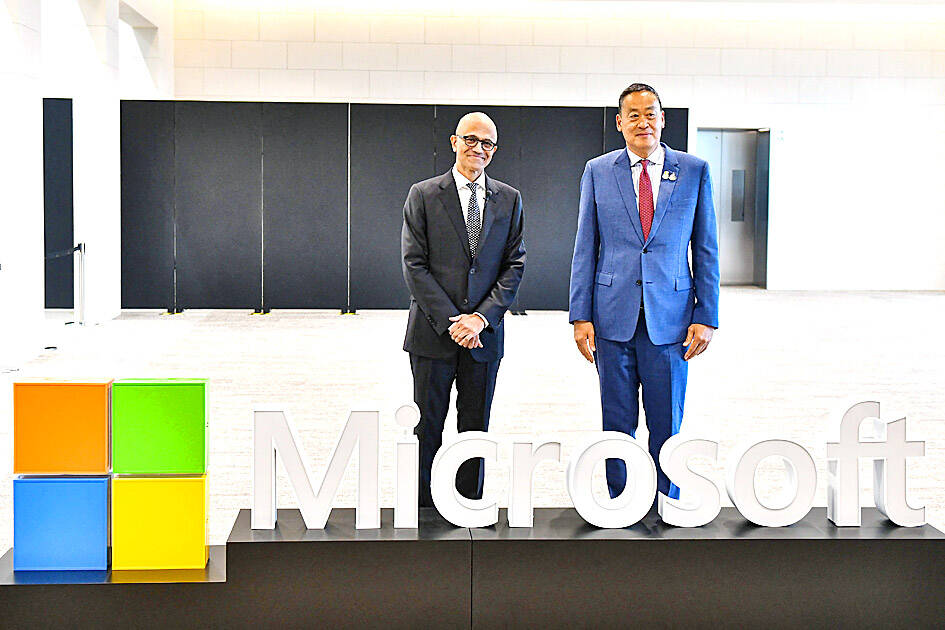Microsoft Corp yesterday said that it would create Thailand’s first data center region to boost cloud and artificial intelligence (AI) infrastructure, promising AI training to more than 100,000 people to develop tech.
Bangkok is a key economic player in Southeast Asia, but it has lagged behind Indonesia and Singapore when it comes to the tech industry.
Thailand has an “incredible opportunity to build a digital-first, AI-powered future,” Microsoft chairman and chief executive officer Satya Nadella said at an event in Bangkok.

Photo: AFP / Royal Thai Government
Data center regions are physical locations that store computing infrastructure, allowing secure and reliable access to cloud platforms.
The global embrace of AI has boosted sales of Microsoft’s key cloud services such as Azure, which have become the core of its business under Nadella’s leadership.
Nadella said that the “full Azure region” was going to come to Thailand.
Thai Prime Minister Srettha Thavisin, who has pushed digital infrastructure and cloud investments, has undertaken numerous international tours in the past year as he attempts to woo tech firms to invest in the kingdom.
“Thailand is ready for AI,” Srettha said ahead of a meeting with Nadella.
“The government will fully support the growth of the AI industry in this country,” he added.
Thailand is the latest stop on Nadella’s regional tour.
He was in Indonesia on Tuesday, where he pledged to invest US$1.7 billion around AI and cloud computing, and is later to visit Malaysia.
Microsoft has been rewarded by investors since it rolled out generative AI, starting with its US$13 billion partnership with OpenAI, the creator of ChatGPT, last year.
However, eight US newspapers on Tuesday sued OpenAI and Microsoft in a New York federal court for violating their copyright to train the technology behind the ChatGPT and Copilot chatbots.
The newspapers, which include the New York Daily News and the Chicago Tribune, are owned by Alden Global Capital, a Florida-based hedge fund that created the second-largest US newspaper group behind USA Today owner Gannett Co when it bought the Tribune publishing chain in 2021.
OpenAI and Microsoft were also accused of offering verbatim excerpts of full articles, as well as attributing misleading or inaccurate reporting to the publications in some requests.
Other newspapers involved in the suit were the Orlando Sentinel, the Sun Sentinel of Florida, the San Jose Mercury News, the Denver Post, the Orange County Register and the St Paul Pioneer Press.
The suit on Tuesday closely resembles a case filed by the New York Times in December last year, in which OpenAI is also accused of stealing content to train its AI.
Yet several other news firms have entered partnerships with the Microsoft-backed start-up instead of going to court.
They include The Associated Press, the Financial Times, Germany’s Axel Springer, French daily Le Monde and Spanish conglomerate Prisa Media.

When an apartment comes up for rent in Germany’s big cities, hundreds of prospective tenants often queue down the street to view it, but the acute shortage of affordable housing is getting scant attention ahead of today’s snap general election. “Housing is one of the main problems for people, but nobody talks about it, nobody takes it seriously,” said Andreas Ibel, president of Build Europe, an association representing housing developers. Migration and the sluggish economy top the list of voters’ concerns, but analysts say housing policy fails to break through as returns on investment take time to register, making the

NOT TO WORRY: Some people are concerned funds might continue moving out of the country, but the central bank said financial account outflows are not unusual in Taiwan Taiwan’s outbound investments hit a new high last year due to investments made by contract chipmaker Taiwan Semiconductor Manufacturing Co (TSMC, 台積電) and other major manufacturers to boost global expansion, the central bank said on Thursday. The net increase in outbound investments last year reached a record US$21.05 billion, while the net increase in outbound investments by Taiwanese residents reached a record US$31.98 billion, central bank data showed. Chen Fei-wen (陳斐紋), deputy director of the central bank’s Department of Economic Research, said the increase was largely due to TSMC’s efforts to expand production in the US and Japan. Investments by Vanguard International

WARNING SHOT: The US president has threatened to impose 25 percent tariffs on all imported vehicles, and similar or higher duties on pharmaceuticals and semiconductors US President Donald Trump on Wednesday suggested that a trade deal with China was “possible” — a key target in the US leader’s tariffs policy. The US in 2020 had already agreed to “a great trade deal with China” and a new deal was “possible,” Trump said. Trump said he expected Chinese President Xi Jinping (習近平) to visit the US, without giving a timeline for his trip. Trump also said that he was talking to China about TikTok, as the US seeks to broker a sale of the popular app owned by Chinese firm ByteDance Ltd (字節跳動). Trump last week said that he had

STRUGGLING TO SURVIVE: The group is proposing a consortium of investors, with Tesla as the largest backer, and possibly a minority investment by Hon Hai Precision Nissan Motor Co shares jumped after the Financial Times reported that a high-level Japanese group has drawn up plans to seek investment from Elon Musk’s Tesla Inc to aid the struggling automaker. The group believes the electric vehicle (EV) maker is interested in acquiring Nissan’s plants in the US, the newspaper reported, citing people it did not identify. The proposal envisions a consortium of investors, with Tesla as the largest backer, but also includes the possibility of a minority investment by Hon Hai Precision Industry Co (鴻海精密) to prevent a full takeover by the Apple supplier, the report said. The group is